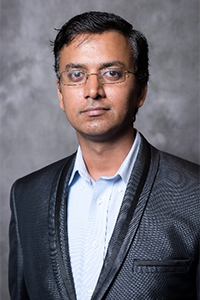Graduate Seminar Series
October 14, 2022
12:20 p.m. ET
Porter Hall - Room 100
October 14, 2022
12:20 p.m. ET
Porter Hall - Room 100
Steels have played a very important role in the progress of human civilization and are one of the most widely used materials in modern-day world. It is used in a wide array of applications including the construction of pipelines. The linepipe steels used in the construction of pipelines have evolved over the years where strength and ductility both have increased in tandem through careful microstructural design. At present, steel manufacturers are putting effort to develop thick gauge linepipe steels to address the demand for thick gauge steels for transporting oil and natural gas (and in near future CO2 and hydrogen) at higher pressures for increased productivity. The processing of a thick gauge steel is a challenge in terms of the total thickness reduction that can be achieved during hot rolling and also steep thermal gradient existing through the thickness of the thick plate during processing. Both these factors influence microstructural homogeneity and hence mechanical properties through the thickness of the hot-rolled plate. In this regard, Nb as microalloying has been found to be very effective in addressing this processing related concern. Nb controls the microstructural evolution during different stages of hot-rolling process, and subsequently, phase transformation of austenite to other transformation products during coiling of the hot-rolled plate. This presentation will focus on how addition of Nb affects precipitate evolution and texture in an API grade X70 linepipe steel. The precipitate and texture characterization has been carried out using scanning electron microscope, transmission electron microscope, and electron backscattered diffraction. In addition to this, I will also share with you some other research work currently being pursued in my lab at the University of Alabama.
 Dr. Nilesh Kumar is an Assistant Professor in the Department of Metallurgical and Materials Engineering at the University of Alabama. Prior to this, he was a post-doctoral research associate in the Department of Nuclear Engineering at North Carolina State University Raleigh and the University of North Texas Denton. He obtained his Ph.D. degree in Materials Science and Engineering from Missouri University of Science & Technology Rolla. A common theme which cuts across all the research work Dr. Kumar has carried out so far is establishing correlation among processing (thermo-mechanical, friction stir processing, and laser), microstructure (grain-size, dislocations, and precipitates), and mechanical properties (strength, ductility, creep, creep-fatigue, residual stress, and stress corrosion cracking) of metallic materials (aluminum alloys, magnesium alloys, austenitic stainless steels, titanium alloys, high-entropy alloys, advanced high strength steel) used primarily in transportation and power-generation industries. He has published so far forty-one (41) papers in peer-reviewed journals, co-authored four (4) books, and contributed four (4) book/handbook chapters. Dr. Kumar is a member of several scientific organizations and has been reviewers for more than two dozen scientific journals. He is also the recipient of 2019 Kent D Peaslee Junior Faculty Award by the Association for Iron & Steel Technology (AIST) Foundation and holds the title of AIST Foundation Steel Professor.
Dr. Nilesh Kumar is an Assistant Professor in the Department of Metallurgical and Materials Engineering at the University of Alabama. Prior to this, he was a post-doctoral research associate in the Department of Nuclear Engineering at North Carolina State University Raleigh and the University of North Texas Denton. He obtained his Ph.D. degree in Materials Science and Engineering from Missouri University of Science & Technology Rolla. A common theme which cuts across all the research work Dr. Kumar has carried out so far is establishing correlation among processing (thermo-mechanical, friction stir processing, and laser), microstructure (grain-size, dislocations, and precipitates), and mechanical properties (strength, ductility, creep, creep-fatigue, residual stress, and stress corrosion cracking) of metallic materials (aluminum alloys, magnesium alloys, austenitic stainless steels, titanium alloys, high-entropy alloys, advanced high strength steel) used primarily in transportation and power-generation industries. He has published so far forty-one (41) papers in peer-reviewed journals, co-authored four (4) books, and contributed four (4) book/handbook chapters. Dr. Kumar is a member of several scientific organizations and has been reviewers for more than two dozen scientific journals. He is also the recipient of 2019 Kent D Peaslee Junior Faculty Award by the Association for Iron & Steel Technology (AIST) Foundation and holds the title of AIST Foundation Steel Professor.
July 8 2025
1:00 PM ET
Materials Science and Engineering
"Uncovering the Driving Force of Thermal-Activated Grain Boundary Migration in Polycrystals," presented by Zipeng Xu
Doherty A310
July 29 2025
11:00 AM ET
Materials Science and Engineering
Graduate Programs Information Session
Learn more about the master's and doctoral programs in materials science and engineering at CMU.
August 13-15 2025
Materials Science and Engineering
Workshop on Methods for Three-Dimensional Microstructure Studies
The workshop is intended for researchers at all levels and will combine presentations on 3D microstructure science as well as practical presentations on the tools and methods for reconstructing, analyzing and synthesizing.
Scott Hall 5201 (Bosch Sparks Conference Room)